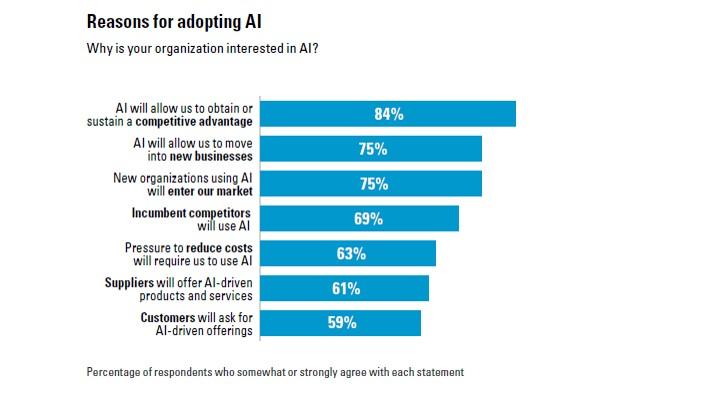
How To Build AI Management Software
Interested in how to build AI management software?
This is an excellent market with many opportunities to be explored.
With great financial rewards as well as the chance to innovate in this industry, companies are rushing to create innovative new AI business management software solutions.
The Market for AI in Business Management

Artificial Intelligence has a growing market. The global market for AI was valued at .67 billion back in 2018, however, it‘s expected to reach 2.57 billion by 2026, according to this Globe Newswire report.
How To Build an AI Business Management Software

I will now explain the steps involved in building an AI business management software, and these are as follows:
1. Induct your core team instead of an entire project team for project planning
As the first step, you need to hire a competent project manager (PM), an IT architect, and a team of business analysts. They need to have experience with developing AI solutions, and this team will need to discuss with the business stakeholders to gather the requirements. They will need to define the project scope.
2. Factor in the AI development lifecycle in your project planning
AI development is a full-blown software development project, however, it has a few unique flavors. Your project planning exercise should factor in the AI development lifecycle. The phases of this entire project lifecycle are as follows:

Get a complimentary discovery call and a free ballpark estimate for your project
Trusted by 100x of startups and companies like
- Define why you would use AI, i.e., identify the business functions that you could positively impact with AI.
- Select the business processes and sub-processes that you could meaningfully automate using AI.
- Take adequate care to select data sets for “training” your proposed AI system.
- Identify the AI capabilities you need.
- Choose the right SDLC model for the project.
- Analyze the requirements.
- Design the AI solution.
- Develop your proposed AI system.
- Test the AI system.
- Deploy the AI app and maintain it.
Read more about the AI development lifecycle in “AI development life cycle: explained”.
3. Ascertain the AI capabilities you need
The business requirements will determine which AI capabilities you need as this will determine which technology stacks you will need. Various AI capabilities are as follows:
- Machine Learning (ML): This includes deep learning, supervised learning, and unsupervised learning.
- Natural Language Processing (NLP): Content extraction, classification, machine translation, question answering, and text generation fall within the ambit of this capability.
- Vision: This AI capability includes image recognition and machine vision.
- Speech: Speech-to-text and text-to-speech are parts of this capability.
- Other key AI capabilities are expert systems, planning, and robotics.
You can read more about these AI capabilities in “Artificial Intelligence: definition, types, examples, technologies”.
4. Prepare a cost estimate for the AI development process
As part of your project planning exercise, you will need to prepare a cost estimate for the project. You need to factor in the following cost elements while estimating:
- Manpower cost;
- Managed cloud services cost, assuming you won‘t manage IT infrastructure and you will sign-up with a managed cloud services provider;
- The cost for API solutions corresponding to different AI capabilities;
- The cost of other tools;
- Other administrative costs.
I earlier explained how to estimate the cost of an AI development project, and you can read it in “How much does it cost to develop an AI solution for your company?”.
5. Form the rest of the project team
You now need to get the rest of the project team members together which requires you to induct the following roles:
- UI designers:
- AI developers covering various AI capabilities like ML, NLP, vision, speech, etc.;
- Web developers with Node.js skills;
- Testers;
- DevOps engineers.
If your project scope includes developing mobile apps, then you would also need to induct Android and iOS developers. You should look for Android developers with Java skills and iOS developers with experience in Objective-C.
AI development projects can be complex and they typically have high visibility. I recommend that you induct a field expert development team for such projects, as I have explained in “Freelance app development team vs. field expert software development teams”.
6. Procure the right managed cloud services to build automation tools
Using managed cloud services platforms eliminates the need for you to manage IT infrastructure, therefore, I recommend that you take advantage of these. Amazon Web Services (AWS) has robust cloud capabilities, and I suggest you sign-up with it.
AWS offers various cloud services and you can choose what you need. E.g., if you only need Infrastructure-as-a-Service (IaaS), then you can use Amazon Elastic Compute Cloud (EC2).
On the other hand, if you want a Platform-as-a-Service (PaaS) for developing a web app, then AWS Elastic Beanstalk is a great option. It offers plenty of advantages, e.g.:
- Elastic Beanstalk manages cloud infrastructure, networking, storage, operating system, middleware, and runtime environment. This enables you to focus on development.
- You can use the application performance management (APM) and auto-scaling solutions offered by AWS to scale your web app.
- Elastic Beanstalk makes it easy to integrate databases and 3rd party APIs.
- Developers can use robust AWS DevOps tools.
I have earlier explained these advantages in “10 top PaaS providers”.
If your project scope includes developing mobile apps, then you will find AWS Amplify quite helpful. Amplify is the Mobile-Backend-as-a-Service (MBaaS) offering from AWS, and it offers the following advantages:
- Amplify manages cloud infrastructure, persistent storage, etc. You don‘t need to build and manage the mobile backend, therefore, you can focus on the front end.
- A mobile app needs security features, moreover, it should have user management and push notification features. You will find it easy to implement these when using Amplify.
- Programmers can easily integrate 3rd party APIs when using Amplify.
- Scaling a mobile app is easy if you use AWS Amplify.
You can read more about these advantages in "Where to Host Mobile App Backend?" and “How to Choose the Best Mobile Backend as a Service (MBaaS)?”.
7. Choose the right AI/ML API solutions
There are several market-leading AI/ML API solutions covering various AI capabilities, and your choice of a solution depends on your requirements. I will describe a few API solutions so that you can make the right choice. Here we go:
Amazon Rekognition
If your proposed AI solution needs image and video analysis capabilities, then Amazon Rekognition could be a good choice. This API solution enables you to identify objects, people, text, scenes, and activities.
E.g., if you are building facial recognition software, then Amazon Rekognition is worth considering. It offers accurate facial analysis and recognition capabilities, and this API solution is highly scalable. It‘s a fully managed API solution, moreover, Amazon continuously “trains” it with new data.
Amazon Comprehend
Are you building an AI application to discover insights and relationships in texts? You could consider Amazon Comprehend, a robust NLP solution from Amazon.
Hire expert developers for your next project
1,200 top developers
us since 2016
Amazon Comprehend offers many features, e.g.:
- Keyphrase extraction;
- Sentiment analysis;
- Syntax analysis;
- Entity recognition;
- Relationship extraction;
- Custom entities;
- Language detection;
- Custom classification;
- Topic modeling;
- Multiple language support.
Amazon Comprehend APIs and SDKs are easy to use, and you can access its extensive documentation in “Amazon Comprehend developer resources”.
Microsoft Azure AI Platform
Microsoft Azure AI Platform utilizes the impressive cloud and AI capabilities of Microsoft. It‘s a comprehensive AI development platform, which offers the following key AI capabilities:
- Machine Learning (ML);
- Vision, including object recognition;
- Speech recognition and other speech capabilities;
- Machine translation and other language capabilities;
- Knowledge mining.
The Azure AI Platform offers many benefits, thanks to its many tools and services. E.g., its ML capabilities include services like Azure ML, Azure Databricks, etc.
Similarly, the knowledge mining capabilities in the Azure AI Platform include advanced services like Azure Search, Form Recogniser, etc. The Azure AI Platform features extensive documentation and you can find it on its website.
Google Cloud AI Platform
Google Cloud AI Platform is yet another example of robust cloud capabilities working hand-in-hand with considerable AI capabilities. This AI platform offers all the key AI capabilities, e.g.:
- Machine learning (ML);
- Deep learning;
- Natural Language Processing (NLP);
- Speech.
For each of the above capabilities, Google offers impressive tools and services. E.g., the Google Cloud AI Platform includes Kubeflow, an open-source platform from Google to create portable ML pipelines. You can access the comprehensive documentation for Google Cloud AI Platform in “AI Platform documentation”.
Note: This list of AI APIs/SDKs isn‘t exhaustive, and you can find more examples in “The Best Artificial Intelligence software development tools”.
8. Code, test, and deploy your app using other relevant tools and guidelines
Depending on your scope, you might need to use the following tools and guidelines:
- You can use IntelliJ IDEA to code the web app. Read “js and NPM” to find out how you can code a Node.js app using this IDE.
- Read “Deploying Node.js applications to AWS Elastic Beanstalk” to learn how you can test and deploy a Node.js web app on AWS Elastic Beanstalk.
- Use Android Studio to code the Android app, and read “Publish your app” to learn how you can publish it to Google Play.
- Code the iOS app using Xcode, and follow the instructions in “Submit your apps to the App Store” to publish it to the Apple App Store.
Additional Factors To Consider When Building an AI Business Management Software
Now that you understand the steps to build an AI business management software, you need to consider a few additional factors. These might involve trade-offs. Your decisions concerning them depend on your project management requirements, organizational requirements, and business context.
These factors are as follows:
1. Developing own algorithms vs using a market-leading AI platform like IBM Watson
Would you develop your own algorithms, or would you use a prominent AI platform available in the market to build automation software? This remains a key question for entrepreneurs and enterprise IT leaders alike.
Why does this question arise? It’s due to the following reasons:
- You might need multiple AI capabilities to deliver functionality, e.g., NLP (“Natural Language Processing”), computer vision, AI workflow, “Artificial Neural Networks” (ANNs), ML (“Machine Learning”), “Speech-to-Text”, “Text-to-Speech”, etc.
- You might need capabilities like predictive modeling, predictive analytics, etc.
- Assess your use case. Developing virtual assistants like Siri or Cortana involves fewer complexities. Building a chatbot to assist human beings isn’t complex either. However, use cases in the healthcare sector can be complex.
- Unique and customized requirements might require hand-coded AI solutions instead of AI software available in the market.
- Stringent non-functional requirements (NFRs) might require AI tools available in the market. E.g., you might need real-time analytics on a crucial area with a high volume of data. AI platforms offered by the cloud computing giants help to build scalable and performant products.
- The talent available in your organization influences your decision.
Develop your AI solution from scratch if you have unique requirements and you don’t want to depend on companies like Microsoft, Amazon, etc. Do the following:
- Develop robust project plans and technical solutions.
- Onboard the right people. This could include a project manager, architect, Python developers, testers, DevOps engineers, etc. You might need to hire data scientists and developers experienced in data analysis.
- Execute, monitor, and control the project effectively.
Use commercially available AI technology if you want to avoid such heavy lifting.
2. Using open-source AI frameworks like TensorFlow
Let’s assume that you have decided to develop your own AI solution. While handling the bulk of software development, you will use a cloud platform to eliminate IT infrastructure management tasks. You will develop user-facing apps like an Android or a web app. You will also develop the back end.
Well, you have help at hand even in this case too! You can use open-source AI frameworks like TensorFlow. AI software involves plenty of computation, and you need to factor in the optimization aspect.
Popular open-source AI frameworks can streamline your project by simplifying the development effort. Explore the following frameworks:
Hire expert developers for your next project
- TensorFlow;
- Amazon SageMaker Neo;
- Scikit-learn;
- Microsoft Cognitive Toolkit;
- Theano.
Note: This isn’t an exhaustive list.
3. Choosing an AI platform to build management software
Are you planning on leveraging an AI platform instead of the “heavy lifting” involved in developing AI solutions from scratch? There are multiple platforms based on AI. Which one would you choose? Consider the following yardsticks:
- The capabilities of the cloud platform: You need a cloud platform with comprehensive cloud capabilities, which can support your varied IT infrastructural requirements. E.g., some AI workloads require GPUs instead of CPUs. Look for cloud computing providers that can easily support your varied needs. Microsoft Azure AI platform and Google Cloud AI platform are good examples.
- Pricing: Analyze the pricing plans of various AI platforms to see which one fits your budget.
- User-friendliness: A robust AI platform should offer easy-to-use APIs. Automating the training with vast data sets should become easier with a good AI platform.
- Documentation: A great AI platform should offer excellent documentation.
Finally, you need to choose an AI platform based on the AI capabilities that you need. E.g.:
- DataRobot will be a robust choice if you need business intelligence.
- Salesforce Einstein Bots will help you if you want to deploy custom bots trained on your CRM data sets.
- Lobster by EBI.AI could be the right choice if you just want a chatbot for your e-commerce website.
- Use IBM Watson if you want to transform your IVR (“Interactive Voice Response”) system with the help of AI.
- Rainbird, Infosys Nia, and Wipro HOLMES are well-known AI automation platforms
4. Hiring freelancers vs working with software development companies to build management software
We talked about the importance of having the right people on the team. You might explore the option of hiring freelancers. Several freelance platforms might help you to find one, and you might be able to bargain for a low hourly rate.
However, AI projects tend to be complex. This is especially true if you plan to develop all algorithms and modules from scratch. ML and data science programming involve niche skills, which increases the complexity of such projects.
Managing such projects with part-time freelancers can be hard. Freelancers might work on other projects simultaneously, therefore, they might lack bandwidth. Freelancers might leave a project mid-way. You will need to find a replacement in that case.
On the other hand, software development companies have stringent screening processes. They hire high-quality people. Such companies encourage their developers to upskill.
Software development companies can provide you with a cohesive team. Such teams demonstrate greater collaboration, decision-making, and problem-solving competencies. Software development companies provide management support and follow robust processes.
Hire AI developers from software development companies for complex projects.
Planning To Build Management Software?
While this guide, platforms, APIs, and other tools can expedite your project, building an AI business management software can be complex.
AI involves several niche skills, and I recommend that you take help from a reputed software development company such as DevTeam.Space. We offer good software developers who are fully trained in our unique agile process methodology. Our developers are also trained in the Scrum development methodology too.
Our approach allows you to break the project down into smaller iterations which is ideal for creating everything from small MVPs to complex machine learning systems.
You can send us your initial project specifications via this form and we will get in touch with you to discuss more how our field-expert software developers and project managers can assist you.
Further Reading
Here are a few articles that might also interest you:
Frequently Asked Questions on How To Build Management Software
Google Cloud Machine Learning Engine is one of the best examples of AI software available today. It has a range of automation tools that help business manage their processes much more efficiently. For example, in a software development process lot of tasks like dependency management, continuous integration, source code management functionalities, etc. can be automated.
AI is used in a variety of ways to help businesses. AI solutions are already being implemented to help customer retention via more accurate services and loyalty schemes.
AI stands for artificial intelligence. AI software is any program that uses AI or machine learning to improve its own results or function over time.


